Saturday, November 29, 2008
Reflection on Prop 8
Election night was a night of mixed emotions for me. I was excited that Obama had won, but every time my phone vibrated with a call or text message, I was anxious that it might be my sister calling with bad news. She had told me that she would let me know how the California election results were going as soon as she knew. She called me a little while after the polls closed, and I excitedly started talking about Barack Obama. When she said "Yes, but…" I felt my heart sinking. She told me the results so far for Proposition 8, the state proposition that would end gay marriage, adding a constitutional amendment defining marriage as between a man and a woman. It was winning. I tried to come up with reasons why the reporting precincts might be skewed conservative, but it wasn't looking good. I just couldn't believe it could possibly pass. I felt shocked and betrayed by the people of the state where I was born and raised, in whom I had faith to do the right thing, and I felt tears welling up in my eyes.
As a straight woman, the government will recognize my marriage, no matter when I choose to get married or what man I choose to marry. Imagine being in love with someone, wanting to spend the rest of your life with them and get all the legal and social benefits of a marriage, and the government telling you you're not allowed to. This is what millions of couples are being told in California and in most of the rest of the country.
Earlier this year, California judges overturned a state proposition from a few years ago that defined marriage as between a man and a woman and declared same-sex marriage legal. The marriages officially began after 5 p.m. on June 16, 2008, and a number of cities kept their offices open late that day. I was working in San Francisco this summer, and on my bus ride home after work that day, I passed by City Hall. I saw people with signs protesting the marriages, including one that said gay sex is a threat to national security. I was horrified. Imagine having protesters at your wedding. It's a time of celebration, happiness, and love, and as you walk out of the city hall, you see people with signs saying you're going to hell - going to hell for being in love and committing yourself to your partner for the rest of your life.
I have a very hard time understanding any justifications for banning gay marriage at the government level. No matter what your religious beliefs may be, if the state is issuing marriage licenses, it has no right to discriminate against a group of people and deny them their civil rights. Allowing more people to get married is not going to destroy the fabric of our society – it will strengthen it. As many people have mentioned in these debates, it wasn't very long ago that people of different races couldn't get married in parts of this country. Those laws weren't just, and neither is Prop 8 or any other law against same-sex marriage. This is a matter of equality, and by denying gay people the opportunity to be legally married, we are making them second-class citizens. The government is telling a group of people that their committed relationships are in some way less valid than those of straight people. This is why civil unions are not enough. Not only do they not bestow all the legal rights as a marriage, but by putting the relationships in a different category, the state is saying that they are not worthy of the title of marriage.
On November 15, I had the great pleasure of going to a Prop 8 protest here in Houston. Rallies were held all around the country to call for marriage equality and an end to legalized discrimination. The passage of Prop 8 did not end the movement to legalize gay marriage, and I firmly believe that we will change these laws.
Sunday, November 16, 2008
"Our Town" Story
My name is José Valenzuela, and I came from Mexico to Houston three years ago. I had to leave because I couldn't earn enough money to support my family. The job that I had in Mexico didn't even pay enough for us to buy tortillas. I tried to find work that paid more, but it was impossible. Coming to this country was my only option. I came to the U.S. without papers, and I am always afraid that I will be caught and deported. My wife and three children still live in Mexico, and I send money back as often as I can – they depend on me. I miss them very much. Because I don't have a social security number, it's difficult to find a steady job, so I work as a day laborer. I go to the Woodridge Home Depot every morning at 5:30 a.m. Some days I get paid well, and other days I don't get picked up and don't get any money at all. Three weeks ago, a man hired a group of us to work on an apartment building that was damaged in the hurricane. It had flooded, and the carpet was soaking wet and smelled like mold. When he hired us, he said he would pay us $15 an hour. There were five of us, and we worked very hard. We worked ten hours a day, six days a week, for three whole weeks. He told us he would pay us when the job was finished and he saw that we had done well. After a few days, I started coughing a lot, and I got a rash on my arms. I asked for gloves and a mask, but he said no, and that if I wanted to leave I could because he would just find someone else to do the job. We all kept working, and we did everything he asked us to do. One week into the job, I was ripping up floorboards and got a really bad cut on my hand. The boss took me to the hospital, and he said their insurance would pay for it. At the end of the three weeks, we had finished the job, and he handed us checks for $500 each. I said that he owed us a lot more money, but he told me I had worked too slowly, and that's all I deserved. I told him he was breaking the law, but he said that since I was undocumented he didn't have to pay minimum wage, and if I did anything he would call the migra, and they would deport me. He also refused to pay my medical bills from my hand injury. I didn't know what to do, and I was afraid. What am I going to tell my family?
Note that if someone does a job, all labor laws (including minimum wage) apply, regardless of immigration status.
Prop 8 Protest
Here are a few of them:
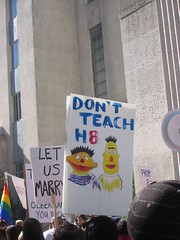
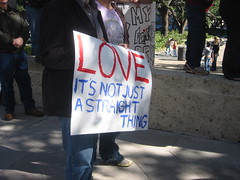
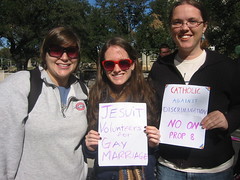
Sunday, November 2, 2008
Election Day
I'll take this opportunity to share how I voted. (Deciding how to vote was a long involved process involving many hours on the phone asking my sister to look things up online and tell me what to do.)
President: Barack Obama
Barack Obama is not my ideal presidential candidate, but he's far better than John McCain for sure. He's too moderate for me, but any presidential candidate with a chance of winning would have to be (for now, at least). And as Democrats go, he's really pretty good. He's a great speaker and has inspired a whole lot of people to take interest in politics and recognize their own power to make change. If he doesn't win, a certain roommate is likely to start breaking things and lighting them on fire, so we're all crossing our fingers here.
Vice President: Joe Biden
I honestly don't know a lot about him, but I do know he voted against giving money to the Salvadoran government in the '80's (which is a very good thing), and he would make an incredible president in comparison to Sarah Palin. Also, the ballot didn't give me a choice whether or not I was going to vote for him if I was going to vote for Obama.
U.S. Representative, 9th District: Barbara Lee
Barbara Lee speaks for me! She's not perfect, but she was the lone voice in Congress voting against funding the war in Afghanistan after 9/11, and I give her major props for that. Also, the other choices are a Republican and a Libertarian, and you know that's not going to happen.
State Senator, 9th District: Loni Hancock
I almost voted for Marsha Feinland, the Peace and Freedom candidate, but after I made my sister read what Hancock has accomplished, I decided to stick with her. She may be part of the establishment in Berkeley ("the establishment" always being a negative thing, of course), but when you're the establishment in Berkeley, you're very progressive by everyone else's standards.
Member of the State Assembly, 14th District: Nancy Skinner
Superior Court Judge, Office 9: Dennis Hayashi
I actually could have gone either way on this, but Hayashi's bio was more impressive to me. I really like his emphasis on civil rights.
City of Berkeley Mayor: Zachary Running Wolf
I chose the write-in candidate because I don't particularly like Tom Bates or Shirley Dean. Running Wolf might not actually make a good mayor, but this is a symbolic protest vote. I met him this summer, and he's a cool guy, though a bit extreme.
Berkeley City Council, District 2: Darryl Moore
I don't know a lot about Moore, but he seems good and better than the guy running against him.
Rent Stabilization Board Commissioners: Clydis Ruth Rogers, Judy E. Shelton, Nicole Drake, Igor Tregub, and Jesse Townley
School Directors: John T. Selawsky and Toya L. Groves
AC Transit District Director, At Large: H.E. Christian (Chris) Peeples
I almost didn't vote for him because I really don't like the weird Belgian-designed buses they have now.
Bart Director, District 7: Lynette Sweet
East Bay Regional Park District Director, Ward 1: Whitney Dotson
State Propositions
Proposition 1A: Yes
I hesitated about this one because it's a whole lot of money, but it would be so cool to have a high speed train to LA.
Proposition 2: Yes
Let the chickens turn around in a circle! This will not give us bird flu.
Proposition 3: Yes
I really like health care for children, and the arguments in favor convinced me.
Proposition 4: No
I actually thought a long time about this. I believe in reducing abortions as much as possible, but I'm afraid this proposition would do more harm than good.
Proposition 5: Yes
I was a little unsure about this because the arguments against it make it seem pretty scary, but our prison system is really bad, and a focus on rehabilitation is very important.
Proposition 6: No
Not good.
Proposition 7: No
Also not good.
Proposition 8: NO!!!
I am very passionately in opposition to this proposition. As I mentioned above, it's the reason I kept my voter registration in California. I'm usually really good at understanding people's points of view, even if I disagree with them. In general, I see complexity and get that issues aren't black and white. However, I have yet to hear any real, legitimate argument against gay marriage. The only arguments I give any recognition to are the religiously based ones - I strongly disagree with these, but I respect the right to believe them (as long as you don't turn them into hateful actions, which I do not respect). But religious arguments have no place in a state proposition. Under the law, we are all equal. By denying same-sex couples the right to marry, we are turning them into second-class citizens. You may say that they can get the same legal protections through state-recognized civil unions, but even if that were the case, refusing to use the word "marriage" says that the nature of the relationship and partnership is in some way different and lesser than that of a straight couple. You may personally believe that is the case, but the government has no right to say that. Gay marriage does not destroy "traditional" marriage. Gay marriage *strengthens* the institution of marriage because it means there will be more loving couples formally and legally committing themselves to each other. Gay marriage creates more stability and is good for children because they can be raised in the committed environment of a marriage. If anything is destroying marriage in this country, it is divorce. If you pay attention to one thing in this blog post, let it be this: VOTE NO ON PROP 8!
Proposition 9: No
This seems like a bad idea.
Proposition 10: No
This is also a bad idea.
Proposition 11: No
I went back and forth about this, but eventually the arguments against it convinced me. I do think that the redistricting process should be changed, I'm just not sure this is the right way to do it.
Proposition 12: Yes
I'm all about helping veterans have homes and farms.
City of Berkeley Measures
Measure FF: Yes
I love libraries.
Measure GG: Yes
I also like fire stations.
Measure HH: Yes
Measure II: Yes
Measure JJ: Yes
I'm impressed that there's no argument against this.
Measure KK: No
I had mixed feelings about this because I would like a say in whether a street becomes bus-only, but it seems like this measure could hold up some positive progress, and the impartial description says that it's "not clear whether the voter approval requirement of the ordinance is lawful because it conflicts with California Vehicle Code," so I decided to vote no.
Measure LL: ???
I didn't vote on this measure because I couldn't even figure out what it would do, let alone whether it was a good idea. If anyone wants to explain it to me, please do.
District Measures
Yes on VV and WW.
If you are a San Francisco voter, please vote no on K, which would keep SF law enforcement from investigating sex trafficking, among other things.
Wednesday, October 15, 2008
Best Friday Night Ever
My very cool roommate Vicky, who has her car here, said she would drive, and another awesome roommate Katie asked if she could come along too. We drove to the house with the food, which was Casa Juan Diego's men's residence, where the door was answered by a young man who no doubt wondered why on earth there were three gringa girls asking for food in broken Spanish. We waited a bit for him to get someone else, and an older man came to the door who knew what was going on. We loaded up 75 small boxes of food in the car, and I called Pancho to confirm where to deliver the food. He said there was a change of plans, and the shelter said it would be best if the workers ate before they arrived, so we took the food to our office. We could have gone home at that point, but I think we all wanted to stick around for the workers to arrive. We started chatting, and pretty soon a guy named Bryan from TEJAS, an environmental justice organization, and his girlfriend showed up. They do some cool media work, and they had been out there with the workers taking some photos and video. A few minutes later, Pancho and Laura showed up with about 15 workers. We gave them food, and as Pancho was describing our organization, the topic of religion came up (since we're an interfaith organization, at least in theory). Pancho started talking about Jesus. Who did Jesus spend his time with while he was on earth? The poor, the exploited. Who would Jesus be spending his time with if he were on earth right now? "Nosotros" (us), they answered. Yes, Pancho said. Jesus is walking with you. He's walking with us. As we organize and and work for justice, we know that Jesus is walking with us. As we try to get stolen wages back, we know that Jesus is walking with us. Even if we can't get the money, Jesus will still be walking with us. (If Pancho had a church, I would definitely go.) As we were talking about how interfaith our organization is, a debate arose about what is the largest religion/denomination in the U.S. One man said the Catholic church was the biggest, and another said the evangelical church. Pancho then noted that capitalism is actually the largest religion in the country. Just look at the size of their temples, he said. A little later, he began to talk about the labor movement and how the rights that we have now are the result of the struggles of many people who came before us. We got these rights because people organized and fought very hard for them. He pointed out to the workers that their efforts to get their money isn't just about them - it's about trying to bring about a more just society for the people who come after them. One man started talking about how terrible his working conditions used to be in El Salvador, and the conversation among the workers turned to structural economic injustices, and how there are so many forces working against them. One man started a rant on neoliberalism.
It was a perfect Friday night.
On Saturday we had an action outside the company office where the workers gathered waiting for their checks. A lot of media came, which was great. I took some photos, which you can see here, and you can see a TV news report here.
Friday, October 10, 2008
Stories from a backward country, from a shameful time
The women’s stories seemed to come from a backward country, or from a shameful time in the United States that many would sooner forget.
Sharing stories from the workplace: Violet Anthony, top, was slammed against a wall and subjected to beatings after she arrived from India; Georgia Danan, middle, was paid just $70 for working a 24-hour shift; and Araceli Herrera, bottom, says employers searched her bags before they would allow her to leave for the day.
One woman, too scared to give her name, told of being struck by her employer in Bethesda, Md., as she scrubbed her hands raw polishing the floor. Another woman, Violet Anthony, who is 29 and from Mumbai, said her face became marbled with bruises after her employer in Queens slammed her into a wall and slapped her. Araceli Herrera said some of her employers inspected her bags before she left their homes and refused to drive her to or from the bus stop, a half-hour’s walk away. One employer, she said, fired her after she had a gallbladder operation and needed a month’s rest.
“With each job, I was exploited more. The thing is, the more you suffer, the harder it is to defend yourself,” said Ms. Herrera, 48, who trained to be an optometrist in her native Mexico and now works as a housekeeper in San Antonio. “We come from an atmosphere of violence, of blows, and we think we have to tolerate that.”
All three women were in Manhattan over the weekend for the first National Domestic Workers Congress, four days of workshops, meetings and a rally to demand rights for a work force that organizers describe as splintered, almost invisible, and staggeringly difficult to organize.
read more
Monday, October 6, 2008
Domestic Worker Organizing
You can hear her talking about her work and the formation of a National Domestic Worker Alliance here:
(Thanks to the Internet Archive!)
Friday, September 26, 2008
A day's work
Tasks for the day:
1. Stop procrastinating.
2. Get over my aversion to using the telephone.
3. Do follow-up calls to congregations that participated in Labor in the Pulpit. Thank them and ask them if they're offering any post-hurricane resources that we could connect workers to.
4. Research food pantries, rent assistance, and other post-hurricane services that are available to people regardless of immigration status.
5. Go through outreach materials on the server and organize them!
6. Psych myself up for making terrifying phone calls in Spanish to check on the status of cases.
7. Make those terrifying phone calls (at least some of them).
In other news, our house finally got electricity yesterday morning, after nearly twelve and a half days. That means no light but candles and flashlights, no refrigerator, no oven, no stove except a one-burner butane stove loaned to us partway through this blackout, and no air conditioning. We are all much happier now. :-)
And finally, McCain has announced that he is going to participate in the debate tonight, so I have something to look forward to this evening. Hooray!
Tuesday, September 23, 2008
Article about day laborers post-hurricane
Legal and illegal, Latinos labor to rebuild Texas
Monday, September 22, 2008
I'm still alive!
My office is also without electricity, so a friendly anti-human trafficking organization has taken us in, and we're sharing space with them.
This last weekend was lovely because the supervisor of one of my roommates was away and offered us her house for the weekend. Not only does she have electricity, but wireless internet and cable TV. It was pretty magical.
So, I stumbled upon the Texas constitution, as I was researching state labor laws, and I thought
it was worthwhile to skim parts of it. I discovered in article 1, section 4, that atheists can be excluded from public office here:
Article 1 - BILL OF RIGHTS
Section 4 - RELIGIOUS TESTS
No religious test shall ever be required as a qualification to any office, or public trust, in this State; nor shall any one be excluded from holding office on account of his religious sentiments, provided he acknowledge the existence of a Supreme Being.
This is Texas, my friends.
I'll write with more substance later. :-) In the meantime, here's a picture of me with some of my roommates when we went to an Astros game.

Tuesday, September 16, 2008
Post-Hurricane Ike
I'll write more later. Thanks for your prayers and support!
Thursday, September 11, 2008
Hurricane Update
Please pray for people in this area, especially closest the coast.
Monday, August 25, 2008
Two Weeks in Texas
My first day of work on Wednesday was nice and easy - I went to a workshop on Globalization, Free Trade, Migration, and Local Organizing. A lot of the information was pretty familiar (thanks Prof. Zunes!). The effects of globalization and free trade push people into such poverty that many migrate for survival and to care for their families. The workshop was structured using a popular education model, which I recognized almost immediately (thanks to Mike Duffy and Dave Batstone for assigning Pedagogy of the Oppressed). The whole organization uses popular education as its model for worker organizing.
On Thursday and Friday I spent time in the office, mainly preparing for a brief presentation I was asked to do on Sunday (and at the same time learning about what I'm doing for my job). We were subcontracted by an organization called Houston Rescue and Restore, which does human trafficking victim identification, to do outreach to domestic workers (this will be a good chunk of my job). Many trafficking victims are held in domestic servitude, but they're very hard to identify. I'll be doing direct outreach to domestic workers, and we'll be holding workers' rights workshops specifically for them, with a component on how to identify a trafficking situation and what to do if you do. The idea is that domestic workers will know the domestic worker community best and be the best people to spread the word. We'll train them to train others, and the hope is that this will raise the number of victims identified and rescued.
On Sunday I traveled to Austin for the first statewide Anti-Human Trafficking Coalition meeting. I learned a lot about human trafficking, and a lot went over my head (they love to use acronyms!). Houston Rescue and Restore organized the meeting, and since my project is one of their projects, I spoke briefly about what we're doing. Here are a few things I learned at the meeting: When the government decides they wouldn't be able to win a trafficking case, usually because there's not enough evidence backing up the victim's testimony, they don't prosecute and the victim doesn't get classified as a trafficking victim, can't receive services or funding, and may be deported. Everybody seems to want the state to step in because there's a state statute against trafficking, but state law enforcement is really ignorant about human trafficking, so they don't take cases either. Overall, the system is messed up in a lot of ways.
Here's your quote of the day: "Hay que cambiar de raíz todo el sistema." - Monseñor Oscar Romero. (My translation: "One must change the whole system from its roots.")
Monday, August 18, 2008
I'm in Texas!
I'm happily settling into a lovely house in Houston right now. We don't have internet access at our house, so I'm sitting in a nearby cafe using wireless. I should have regular access at work, but be aware that my internet time will be much more limited than it used to be, and I may be slow to respond.
Here's an entry I wrote a few days ago:
Saturday, August 16, 2008
As I write this, I'm at a retreat center in Pinehurst, TX, a.k.a. in the middle of the woods about an hour away from Houston. There's no internet here, so I'm typing this on my computer and posting it when I get the chance.
I arrived successfully at the George Bush Intercontinental Airport in Houston on Tuesday. When I was flying in, looking out the window, I was amazed at how green it was and how many trees there were. When we landed, I quickly found the other JVC people. As soon as I stepped out of the air conditioned airport, I knew I was facing my first challenge of the year: heat and humidity. We rode together in a school bus (not air conditioned) to the Circle Lake Retreat Center, which is far more beautiful and amazing than I ever would have expected. With the humidity, it feels like we're in the rainforest. We were warned not to swim in the lake because there are water moccasins (for ignorant people like me, those are snakes), and I discovered some large and colorful varieties of bugs. We've had sporadic rain and thunder (fun!).
During our orientation we focused on the four pillars of JVC: social justice, simple living, spirituality, and community. Each day we focused on one. Someone gave a presentation in the morning, we had a chance for reflection, and in the afternoons we had meetings with our community members to discuss how we'll carry out these principles in our communities.
I'll be living with six lovely young women this year: Stephanie (from Knoxville, Tennessee), Katie (from Cleveland, Ohio), Robin (from New Orleans), Emily (from Santa Cruz, CA), Mary (from St. Louis, Missouri), and Vicky (from near Dallas, TX). We're getting along very well, and I'm excited about spending the year with them. We have a mix of personalities, but a lot of similarities as well (including Catholicism, a dislike of cockroaches, and a desire for clean common areas), and we're all committed to making the community work.
The JVC program is based on the four pillars I mentioned above. When we signed up to do JVC, we signed the JVC South Covenant, which we've revisited throughout the orientation. To give you a better sense of the program, here are sections from the covenant:
Social Justice: In order to work for justice we must become aware of our role in society. We are called to change the attitudes and structures, both personal and societal, which create poverty and oppression.
Simplicity of Lifestyle: Honoring simplicity allows us to value relationships over objects. Living simply brings us closer to awareness of God and Creation, our humanity, and our lifestyle's effects on others.
Community: Communal life allows for mutual support and encouragement in the difficult work we choose to do as volunteers. It challenges us to be open, compassionate and willing to grow. We learn that our lives are interconnected and we have responsibility towards all members, as they do to us.
Spirituality: Spirituality is both the awareness of and our reaction to God's presence in the world. It is in realizing God's love for us that we can then turn to others with love. As Christians, we recognize the responsibility we have to each other and follow the Ignatian tradition of reflection and action.
Wednesday, July 16, 2008
JVC Job Description
- Education: Provide Workers Rights Trainings to low-wage workers throughout the Houston Area at the Workers’ Center, churches, community centers and events. Create & distribute educational materials for workers.
- Casework/Wage Recovery: Intake of new Cases, Create a plan with workers, connect with allies in the religious community, government agencies, attorneys and social service provides and Execute plan with support of staff. Work with employers to recuperate unpaid wages.
- Organizing/Campaigns to Improve Working Conditions: Meet with workers & create spaces for collaboration between workers and aforementioned allies and execute Plans of Action.
- Leadership Development: Identify leaders among workers and create plan to develop a leadership at HIWJC. In collaboration with the staff, identify, train and mobilize the religious community on low-wage workers struggles for justice on the job.
Monday, June 23, 2008
Let's Waive Some Laws 'Cause we Feel Like it
WASHINGTON - The Supreme Court on Monday turned down a plea by environmental groups to rein in the Bush administration's power to waive laws and regulations to speed construction of a fence along the U.S.-Mexican border.*sigh*Homeland Security Secretary Michael Chertoff has used authority given to him by Congress in 2005 to ignore environmental and other laws and regulations to move forward with hundreds of miles of fencing in Arizona, California, New Mexico and Texas.
The case rejected by the court involved a two-mile section of fence in the San Pedro Riparian National Conservation Area near Naco, Ariz. The section has since been built.
"I am extremely disappointed in the court's decision," Rep. Bennie Thompson, D-Miss., said. "This waiver will only prolong the department from addressing the real issue: their lack of a comprehensive border security plan."
Thompson chairs the House Homeland Security Committee. He and 13 other House democrats — including six other committee chairs — filed a brief in support of the environmentalists' appeal.
Earlier this year, Chertoff waived more than 30 laws and regulations in an effort to finish building 670 miles of fence along the southwest border. Administration officials have said that invoking the legal waivers — which Congress authorized in 1996 and 2005 laws — will cut through bureaucratic red tape and sidestep environmental laws that currently stand in the way of fence construction.
http://news.yahoo.com/s/ap/20080623/ap_on_go_su_co/scotus_border_fence
I had read about this before, but I forgot about it. How did this government happen?
Saturday, May 17, 2008
Graduation!

I had a fantastic day, and tomorrow morning I am off to Peru. Hopefully I'll blog while I'm there! I'll be back on Tuesday the 27th.
Wednesday, May 7, 2008
Brewster Kahle 1, FBI 0
Online librarian from S.F. wins his fight with the FBI
"Brewster Kahle, who runs an online library in San Francisco, was appalled when his volunteer lawyers told him in November that the FBI was demanding records of all communications with one of his patrons as part of an investigation of 'international terrorism or clandestine intelligence activities.' ...
"He was allowed to speak publicly Wednesday under a rare settlement in which the FBI agreed to withdraw its letter and lift the gag order."
Tag Cloud
I love my tag cloud. Library and people stand as the most common words, which I think is a fantastic reflection on my values. Books, digital, photos, and USF are runners-up. Some common words reflect my mediocre vocabulary (lot, really, something, things). I love the sequence in descending size, "library literacy lot love" (with a tiny "life" sticking itself in there).
Clearly, most of my posts have been related to my Digital Literacy class, but my blog entries have rarely felt like assignments (at least not in the burdensome sense). I've had a wonderful time doing this blog and this class. I'm happy that I've created something that I like and find interesting.
This class was never about telling us what to do - it was about encouraging us to do something, to use these technologies in ways that work for us. For me, that was a lot of announcements about things happening at USF, random interesting resources or information, work I was doing in other classes, and personal reflections.
As the semester comes to a close, the question remains, what will become of this blog? I'm definitely going to continue blogging here, but I expect the common themes will shift as my activities shift. Over the summer you can expect a lot about service-learning, and starting in August you'll hear about JVC and worker's rights issues. I'm sure I'll still talk about digital literacy sorts of things, since that's such a big interest of mine, and of course I'll continue to post about any other random stuff I want to share with the world.
I'm excited.
Sunday, May 4, 2008
Photos of the World
One of the wonderful things about the Internet is how global it is. It can do a lot to break down artificial barriers we've built between groups of people. With the help of Flickr, I'm going to start posting photos from around the world.
Since I'm traveling to Tacna, Peru in a few weeks, here is the first photo, from Tacna:
 "la dueña del pan"
"la dueña del pan"by arcketipo
How to Post Photos on Your Blog
The easiest way is if you have a Flickr Pro account and you're working with your own photos or the photos of someone who has given others permission to use their photos through a Creative Commons license.
At the top of every photo, if you have a Flickr Pro account, there is a menu that includes "all sizes."
 Click on "all sizes" and choose the size you want to include on your blog (probably small or medium, depending on your blog and the photo).
Click on "all sizes" and choose the size you want to include on your blog (probably small or medium, depending on your blog and the photo).If the photo belongs to you or has been licensed for sharing, scroll down and you'll see something like this:
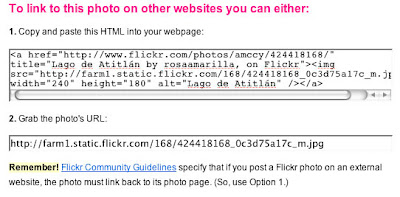 Assuming you want to link back to Flickr, copy the HTML from the top window into your blog post window. Note that if you're in "Compose" mode in Blogger, you don't have to go into "Edit HTML." I copied and pasted it in, and voila:
Assuming you want to link back to Flickr, copy the HTML from the top window into your blog post window. Note that if you're in "Compose" mode in Blogger, you don't have to go into "Edit HTML." I copied and pasted it in, and voila: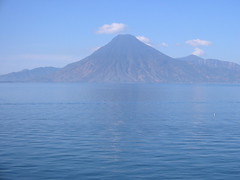
But! What if your situation is not so straightforward? What if you wanted to, er, borrow photos without permission? (Because clearly that person didn't know how to put a Creative Commons license on their photos, right?) Or, what if they are sharing their work, but you don't have a Pro account? Or what if you're using a photo that's not on Flickr?
What you do is find your photo of choice in your size of choice (if applicable), then control-click (Mac) or right-click (PC) and choose "Copy Image Location" (or the equivalent). Then use this HTML code:
<img src="http://imageurl.jpg">
But, what if you want that photo to link back to the page you got it from (or some other web page)? Go copy the URL for your desired page and use this code:
<a href="http://webpage.com"><img src="http://imageurl.jpg"></a>
But but, what if you want it centered? Do this:
<center><a href="http://webpage.com"><img src="http://imageurl.jpg"></a></center>
You can put those <center> </center> tags around your code copied and pasted from Flickr as well.
What if you want to insert your photo via the Blogger add image tool (if you have the image on your hard drive), and you want to add a link (to Flickr or wherever)? Click on this icon:

Browse to find the photo on your computer, choose your preferred size and alignment, and click to upload. It will put the image at the top of your blog post. Super annoying. You can click on the image to select it, then cut (Mac: command-X; PC: ctrl-X) and paste it in your desired location.
To make that photo into a link, find your desired URL, select the photo (still within your Compose window), and click the Link icon:

Paste your URL in there, and it will link-ify your image (you can check in Preview to make sure it worked). You can also go into Edit HTML and work from there, but if you're not familiar with HTML it's a little scary looking.
If you have any questions or problems, please feel free to ask in the comments, and I'll do my best to answer.
Update: I realized that even if another Flickr user is allowing their photos to be used by others, the HTML code to copy and paste isn't there unless they're your own photos. So if you want to use someone else's photos, use the code I provided with the photo URL and page URL.
Tuesday, April 29, 2008
Gospel Choir Concert
Here's a video from last spring's concert. The visual isn't great, but the sound is pretty good. You can find more videos if you poke around YouTube. (I'm not in this because I was abroad at the time.)
Jasmine Park

Last Thursday, Jasmine Park of Pike/Pine, a Seattle-based street fashion blog, came to speak to our Digital Literacy class. During the week, Jasmine does program management at Microsoft, but every weekend she walks around Seattle looking for fashionable people to photograph. She told us about how she started out and how her blog has developed since September, 2006, when she started it. She created four rules for herself:
1. Take good photos.
2. Make people look good.
3. Be nice.
4. Only post what she's proud of.
And she outlined three lessons she's learned:
1. Everyone's a critic.
2. Diversity is good (and hard to find).
3. People are nice.
It was in interesting talk, especially because fashion is never something I've paid attention to. It was cool to hear from a part-time blogger. It's still just a hobby for her, as it is for most people. I also liked to hear her thoughts on comments and her decision to delete mean comments in order to create a positive environment.
Moral of the story: If someone stops you on the street and wants to take your picture for a fashion blog, be nice and say yes.
Immigration Facts
Immigration Facts:
- There are over 12 million undocumented immigrants currently living in the United States, over half of whom are from Mexico.(1)
- In 1993, at least 205 immigrants died crossing the border into the U.S., and in 2005 the number was over 460.(2) As more border fences go up and security increases (such as with the 1994 Operation Gatekeeper), immigrants must go through very dangerous places, like the desert, to reach the U.S.(3) People die from suffocation, dehydration, hypothermia, and hyperthermia, among other things.
- 94% of adult male undocumented immigrants work, in contrast with 86% of legal immigrants and 83% of natives. Undocumented immigrants made up about 4.9% of the workforce in 2005.(4)
- In the last five years, Mexican immigrants in the U.S. have sent over $90 billion to Mexico. Mexico receives more money from remittances than tourism, and remittances are Mexico’s second largest source of foreign income, after oil.(5) These remesas help sustain families suffering from poverty.
- Immigrants are HUMAN BEINGS.
- Hoefer, Michael, Nancy Rytina, and Christopher Campbell. “Estimates of the Unauthorized Immigrant Population Residing in the United States: January 2006.” Immigration Statistics. Department of Homeland Security. http://www.dhs.gov/xlibrary/assets/statistics/publications/ill_pe_2006.pdf.
- Hill, Jacob. “Free Trade and Immigration: Cause and Effect.” Council on Hemispheric Affairs. 18 July 2007. http://www.coha.org/2007/07/18/free-trade-and-immigration-cause-and-effect/.
- Romellón, Jorge Santibáñez. “Migration and Borders: The Space for Contradiction, page 2.” Border Battles. 31 Aug. 2006. Social Science Research Council. http://borderbattles.ssrc.org/Santibanez/index1.html.
- Passel, Jeffrey S. “The Size and Characteristics of the Unauthorized Migrant Population in the U.S.” Pew Hispanic Center. 7 Mar. 2006. http://pewhispanic.org/files/reports/61.pdf.
- "Finance And Economics: Counting the Cash; Remittances to Latin America." The Economist 6 Oct. 2007: 102.
Sunday, April 27, 2008
stop spam. read books.
 The first thing that struck me was that it asked for two words, instead of the standard one. The second thing I noticed was that there is an audio alternative for people who are visually impaired. This is fantastic. Then I noticed "stop spam. read books," and I was very intrigued. I went to the reCAPTCHA website and learned more.
The first thing that struck me was that it asked for two words, instead of the standard one. The second thing I noticed was that there is an audio alternative for people who are visually impaired. This is fantastic. Then I noticed "stop spam. read books," and I was very intrigued. I went to the reCAPTCHA website and learned more.It turns out they work with book digitization projects like the Internet Archive, and when you type in the distorted word, you are reading a word that a computer could not recognize with OCR (I guess the computer knows when it's not reading a word right). They put one word they already know and one they don't, so if you get one right they know you probably got the other one right. They give the same word image to multiple people to get a higher accuracy rate.
So, for example, in the image above, they might already know that the first word is "Germantown," but their OCR software couldn't read the second word, "were." When I type in "Germantown were," I am helping the Internet Archive turn scanned images of a book page into digital text. Awesome. It looks like you can add it to your WordPress blog, among others, but I didn't see a way to attach it to Blogger.
Thursday, April 24, 2008
A Series of [un]Fortunate Events at USF
April 28
SOLID(arity)
8:30 PM
McLaren Complex
All student teach-in. Awesome presentations, free bread-n-spread snacks, and the opportunity to discuss issues of immigration, fair trade, torture, and the upcoming election with your peers.
We'll be heading over to Ocean Beach afterward for a bonfire.
April 29
Harney Plaza
11:30 AM
Free airbrushed t-shirts! We have some shirts, but first come, first serve. If you'll be late, you can bring your own shirt to be graffitied, too.
There will also be hands on mural painting and an immigration display from USF's chapter of Amnesty International.
April 30
Xavier Chapel
7:00PM
Former Prisoner of Conscience and activist, Father Louie Vitale will give a speech entitled "A Nonviolent Response to Terrorism."
He was recently released from jail for civil disobedience in protest of Fort Huachuca.
Shortly after, he was again arrested at the March 19 anti-war rally in San Francisco.
Carlos Mauricio, founder of Stop Impunity, will speak about his experience as a victim and survivor of torture in El Salvador.
They are both probably 2 of the coolest people ever-- not to be biased or anything.
May 1
Harney Plaza
10:00 AM
Meet to go as a group to the Immigration Rally downtown. Wear your white t-shirt from Tuesday!
Crossroads
6:00 PM
CELEBRATION! Wooo.
*Free Food
*Music
*A short talk from Vietnam War Veteran and SOA Watch activist Charles Liteky.
*A panel on student activism featuring Mike Aguilar, Drea Hightower, Politics Professor James Taylor, and Mel Hackett. Moderated by former USF student Spencer Rangitsch.
*Voter Registration Drive by MEChA
*Information from city organizations like the Committee in Solidarity with the People of El Salvador, Grassroots Campaigns, and the Fellowship of Reconciliation.
Tuesday, April 22, 2008
Reflections on StoneLake Farm

I was struck by the beauty and simplicity I encountered at the farm. It is pretty isolated (we traveled six miles off the highway on a bumpy dirt road that becomes impassable in the winter), and off the electrical grid. They get their power from the sun and their water from the creek that runs through the property. They have goats, chickens, dogs, and some new ducklings.
It was clear that Francis' philosophies about life are deeply ingrained in the way the farm is run. Instead of working against nature, as our industrial world tends to do, it works with nature, in harmony as part of nature.


That line we usually place between people and nature is blurred. The intentions of the farm are pure -- it's not about making money, it's about sustainability.
Life on the farm was certainly different from everyday life in San Francisco. It involved a lot of cooking, eating, and chopping wood for the stove that kept us warm in the snowy weather.
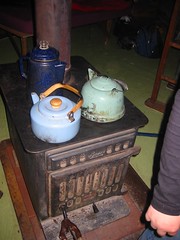

There was no feeling of rushing from one task to the next, another reflection of Francis. When he spoke to us there would often be long pauses, which would normally feel awkward, but didn't. I managed, for the most part, to ignore the homework I brought with me, and I enjoyed some wonderful conversations with my classmates.
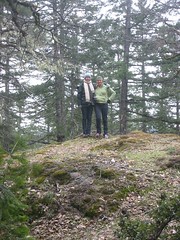
Simple living was a core value of the program I did in El Salvador, and it is a core value of the Jesuit Volunteer Corps, which I will be a part of next year. What does it mean to live simply in a world of consumerism and satisfaction based on material wealth and goods? Some people, like Francis, withdraw from that society and culture and live their own way. For some, that life might be perfect, but I wouldn't want the isolation that accompanies it.
I see two facets of simple living: rejecting materialism and simplifying one's daily life. How do you find a balance between doing all the things you want to do (education, service, activism, spending time with friends and family) and taking a step back, allowing yourself time? I wouldn't consider most of my activities a waste of time, so what could I cut out to allow myself the time to watch the sun set for two hours, as Francis mentioned doing? It's not an easy task, nor is living in harmony with nature when you're in a city and part of American culture, but if we're conscious of our actions, we can do better. I read a book last semester called Affluenza, which describes the all-too-common cycle of working hard, being unhappy at your job, buying material goods to make you happy, working even harder to pay for those things, buying more things to be happy, and so on. That is the lifestyle to avoid, and there's no reason we can't avoid it. Maybe all it takes is a trip to a farm.
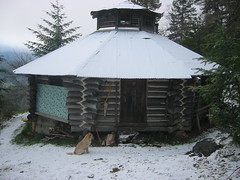
"Live simply, so that all may simply live." - St. Elizabeth Ann Seton
Monday, April 21, 2008
My dad started a blog!
Tuesday, April 15, 2008
Gayla Trail at USF

Last week our Davies Forum speaker was Gayla Trail, creator of You Grow Girl, a website about gardens and gardening. Gayla used to be a designer, and she started the website in 2000 as just something fun to do. She wanted to meet other gardeners like her, who were young and urban, which was not the audience most garden writing focuses on. She said garden writing is dominated by books and magazines, and it is written in a very authoritarian way (this is right, this is wrong, this is how you do it). There's also usually an expectation of space, like a yard, and lots of money. She wanted something different, so she created it herself, and it has become very popular. After a while, she ended up quitting her design work to focus on the website. She talked about the importance of play, and how good it is to be able to have fun and try new things without the pressure of doing well and making money. That's how her site developed the way it did.
To me, Gayla's example shows the power of the internet as a means for creativity and alternative information/messages. I also love the concept of using the internet, which is so "virtual," to share information and experiences about something so earthy and "real life" as gardening.
Monday, April 14, 2008
Service with POH and April Action
The other volunteering I did recently was April Action, a service day organized by University Ministry at USF. April Action always has an environmental theme, and last Saturday a bunch of us went to an area of Golden Gate Park where we cleared out blackberry plants that were hurting the magnolias (or something - I wish they had spent a bit more time talking about the purpose of our work). It was going fine, and it was kind of fun except for my arms getting scratched up from all the thorns, until I heard one of the gardeners telling people to stop, saying something like "uh oh, we have a problem." It turned out someone had set up an encampment inside the blackberries. There were some bags of stuff sitting there; it was somebody's home. The gardener called over the woman who was in charge, and I saw her making a phone call, but we kept clearing away the plants. I think those of us who knew what was happening were pretty apprehensive, however. I was glad to hear other students saying they weren't comfortable destroying someone's home. I certainly wasn't. We had a little reflection afterwards, and I brought up the risks of unintended consequences of service. We can be completely well-meaning, thinking we're doing a good thing, but actually do more damage than good.
For anyone interested in social justice and social change, I highly recommend reading Pedagogy of the Oppressed by Paulo Freire. If you're more interested in an 18-page article than a book, check out "Pedagogy for the Children of the Oppressors" by Andrew Christian van Gorder in the Journal of Transformative Education. I don't feel like breaking copyright laws and posting it, but if you're at USF, search for the journal in the library's Journal Finder, then search the article title, and you should find it. It was published in January 2007.
Thursday, April 10, 2008
National Library Week
We've each been charged with taking as much responsibility as we are willing, so here is what I will do.
Books!
I will collect the list of everyone's favorite books, and collect them from the stacks. I will make a list of them (with call numbers) to post on the back wall of the alcove, so patrons can see them even if they've been checked out.
Options: I can make something for patrons to write down their favorite books to recommend. We can talk to Gleeson Gleanings about posting our list and encouraging people to respond with their recommendations.
What will I need from the library? If they want to change the status of the books to "display" in the catalog, we'll need cooperation. If someone (e.g. Vicki Rosen) lets them know what I'm doing ahead of time, I can go to the circ. desk and ask them to do it.
If we want to do the book recommendations on Gleeson Gleanings, we'll need someone to do that post.
Fun!
Tuesday, April 8, 2008
Kevin Epps
My camera battery is dead at the moment, so I hope Lis will forgive me for using one of hers:

Friday, April 4, 2008
Blogger, Flickr, and Copyright
Flickr, via Yahoo!, says in its Terms of Service:
Yahoo! does not claim ownership of Content you submit or make available for inclusion on the Service. However, with respect to Content you submit or make available for inclusion on publicly accessible areas of the Service, you grant Yahoo! the following worldwide, royalty-free and non-exclusive license(s), as applicable:
With respect to photos, graphics, audio or video you submit or make available for inclusion on publicly accessible areas of the Service other than Yahoo! Groups, the license to use, distribute, reproduce, modify, adapt, publicly perform and publicly display such Content on the Service solely for the purpose for which such Content was submitted or made available. This license exists only for as long as you elect to continue to include such Content on the Service and will terminate at the time you remove or Yahoo! removes such Content from the Service.
(Section 9, incl. Paragraph B)
That "solely for the purpose for which such Content was submitted or made available" part is significantly different from YouTube. It seems like basically they're saying, if you upload your work, it's okay for us to display on the website... which is what happens when you upload your work. I might be wrong though.
The Blogger TOS says:
Your Intellectual Property Rights. Google claims no ownership or control over any Content submitted, posted or displayed by you on or through Google services. You or a third party licensor, as appropriate, retain all patent, trademark and copyright to any Content you submit, post or display on or through Google services and you are responsible for protecting those rights, as appropriate. By submitting, posting or displaying Content on or through Google services which are intended to be available to the members of the public, you grant Google a worldwide, non-exclusive, royalty-free license to reproduce, publish and distribute such Content on Google services for the purpose of displaying and distributing Google services. Google furthermore reserves the right to refuse to accept, post, display or transmit any Content in its sole discretion.
(From Section 6, emphasis in the original)
So they can use my work, but again not to the same extent as YouTube. Interesting.
YouTube and Copyright
I took it upon myself to read the Terms of Use, and I think it's within fair use to copy this paragraph:
For clarity, you retain all of your ownership rights in your User Submissions. However, by submitting User Submissions to YouTube, you hereby grant YouTube a worldwide, non-exclusive, royalty-free, sublicenseable and transferable license to use, reproduce, distribute, prepare derivative works of, display, and perform the User Submissions in connection with the YouTube Website and YouTube's (and its successors' and affiliates') business, including without limitation for promoting and redistributing part or all of the YouTube Website (and derivative works thereof) in any media formats and through any media channels. You also hereby grant each user of the YouTube Website a non-exclusive license to access your User Submissions through the Website, and to use, reproduce, distribute, display and perform such User Submissions as permitted through the functionality of the Website and under these Terms of Service. The above licenses granted by you in User Videos terminate within a commercially reasonable time after you remove or delete your User Videos from the YouTube Service. You understand and agree, however, that YouTube may retain, but not display, distribute, or perform, server copies of User Submissions that have been removed or deleted. The above licenses granted by you in User Comments are perpetual and irrevocable.
(Section 6, Paragraph C)
So there you have it. They can do whatever they want with your work, but it's non-exclusive, so you can still do whatever you want. If you remove your video, they can still keep a copy, but they can't use it anymore. Interestingly, they have a Copyright page within their Help Center, but it doesn't mention this.
On a side note, the issue of jurisdiction for Internet companies has come up in my Communication Law and Policy class, and I noticed the last paragraph of the Terms of Use begins with:
You agree that: (i) the YouTube Website shall be deemed solely based in California; and (ii) the YouTube Website shall be deemed a passive website that does not give rise to personal jurisdiction over YouTube, either specific or general, in jurisdictions other than California. These Terms of Service shall be governed by the internal substantive laws of the State of California, without respect to its conflict of laws principles. Any claim or dispute between you and YouTube that arises in whole or in part from the YouTube Website shall be decided exclusively by a court of competent jurisdiction located in San Mateo County, California.
(Section 14)
The Terms of Use are actually pretty short and simple, so if you're unsure about anything, you can read it yourself.
Tuesday, April 1, 2008
Corners
This week's assignment is to talk about a place we like, using the concepts of Kelly Quinn and Jane Jacobs to describe why. This was an interesting exercise for me, because while our Jacobs reading made a lot of sense to me, I tend to enjoy parks and relatively isolated places (unsafe as they may be). However, in Kelly Quinn's lecture on Thursday, one thing that stuck out to me in particular was her description of the value of corners, which there are many of when your city is set on a grid. This brought to mind the most famous corner around: Haight and Ashbury.

Quinn said that the grid is the most democratic form of urban planning, and that at corners you connect with people who are unlike yourself. One of the things I like about Haight Street is the variety of people you encounter. You find tourists, locals, yuppies, hippies, poor people, wealthy people, young people, and old people, of all sorts of colors and orientations. Jacobs writes about good urban planning being a way to fight segregation and racism (she offers the example of someone in Los Angeles who had never actually seen a Mexican person). If we don't isolate communities from each other, they will interact and come to realize that their differences are superficial.
Jacobs wrote about the importance of eyes on the street in order to maintain safety. Haight Street is always bustling with activity, even until late at night. I would feel safer walking down Haight at night than I would walking back home through the quiet residential streets.
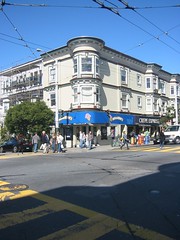
Another very important thing to Jacobs is the anonymity that cities offer. Residents don't want to be best friends with each other, but for a safe and stable environment, there needs to be a level of trust. To me Haight Street feels like it has more of a culture of trust than other busy city streets I know, perhaps because of the quantity of pedestrians and the fact that many of them are there for the sake of being there, rather than just passing through on their way somewhere else. They have a certain level of investment in the neighborhood.
